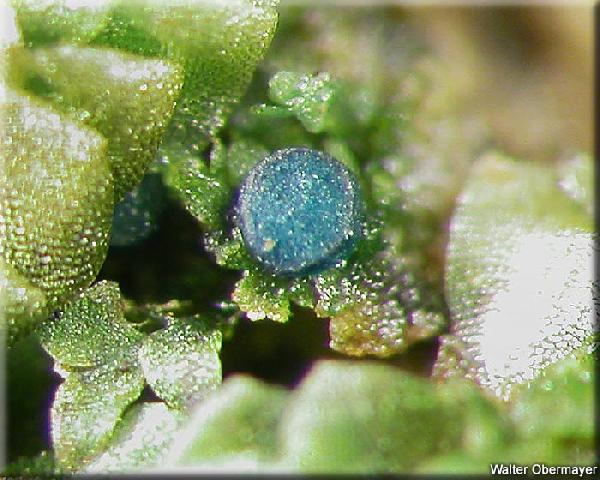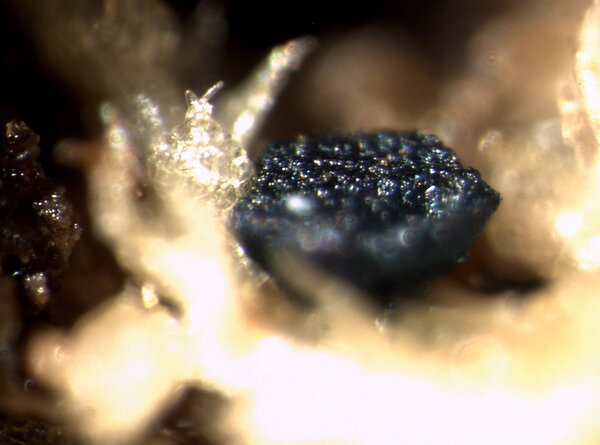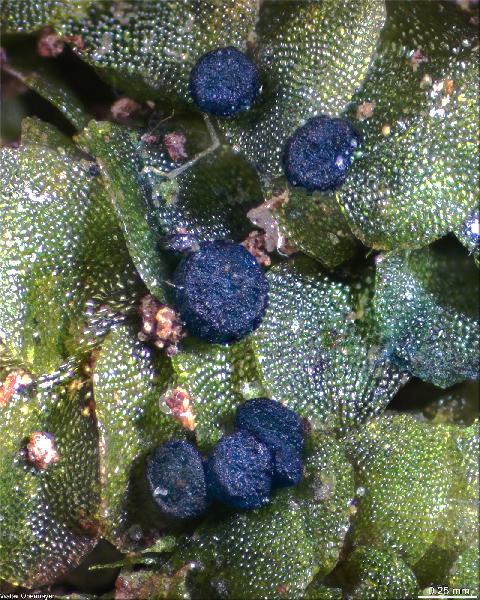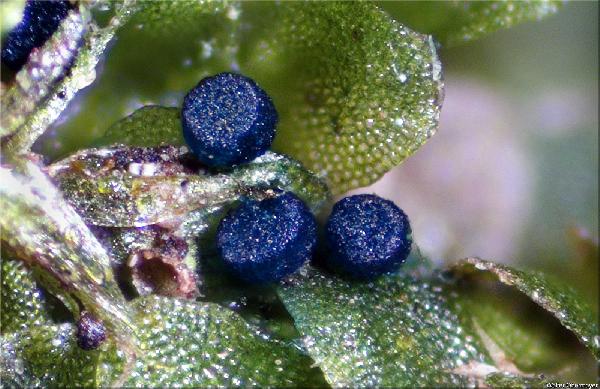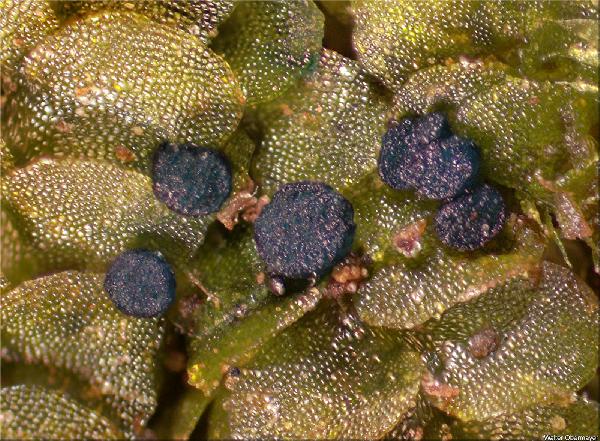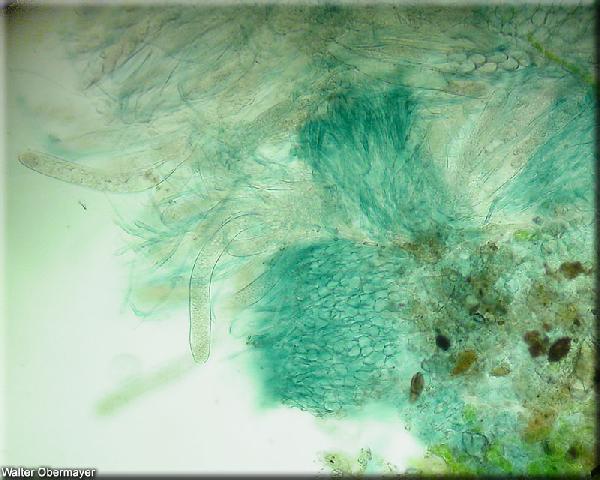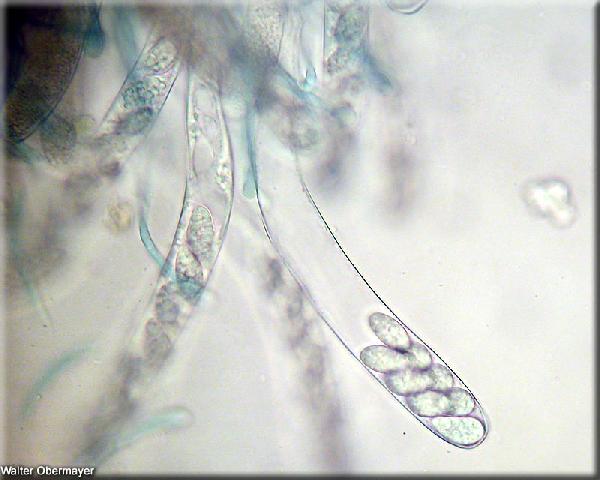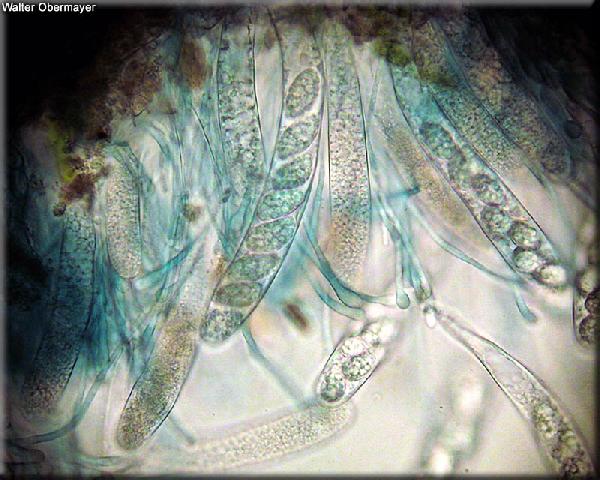Mniaecia jungermanniae (Fr.) Boud.
Hist. Class. Discom. Eur: 99, 1907. Basionym: Peziza jungermanniae Fr. - Syst. Mycol., 2: 144, 1822.
Synonyms:
Description: Thallus immersed in leaflets of liverworts, not lichenized and not apparent. Apothecia rounded, sessile, dark blue to bright blue-green, rarely pale blue-green when wet, almost black when dry, 0.2-0.6(-1) mm across, usually arranged in larger clusters, with a flat to finally slightly convex disc and a thin, slightly raised, poorly evident margin. Proper exciple blue-green, of vertically arranged, globose to slightly angular, 7-16 μm wide cells forming a textura globulosa or globulosa-angularis; epithecium blue-green, N-; hymenium colourless, 100-150(-180) μm high, I-, K/I-; paraphyses 1.5-3 μm thick, simple or forked in upper part, the apical cells distinctly clavate, up to 7(-8) μm wide, blue-green piogmented, some paraphyses often longer than the asci; hypothecium colourless. Asci 8-spored, cylindrical-clavate, with a thick, non-amyloid apical dome containing a cylindrical tube, 136-160(-195) x 19-22 μm. Ascospores 1-celled, hyaline, ellipsoid to pyriform, (14-)16-22(-24) x 8-12(-13) μm, filled with many oil droplets, without a distinct perispore, at first uniseriately, then biseriately arranged in the asci. Photobiont absent. Spot tests: all negative. Chemistry: without lichen substances.
Growth form: Fungus
Substrata: soil, terricolous mosses, and plant debris
Reproductive strategy: mainly sexual
Commonnes-rarity: (info)
Alpine belt: absent
Subalpine belt: extremely rare
Montane belt: extremely rare
Dry submediterranean belt: absent
Humid submediterranean belt: extremely rare
Padanian area: absent
pH of the substrata:
1 2 3 4 5
Solar irradiation:
1 2 3 4 5
Aridity:
1 2 3 4 5
Eutrophication:
1 2 3 4 5
Poleotolerance:
0 1 2 3
Altitudinal distribution:
1 2 3 4 5 6
Rarity
absent
extremely rare
very rare
rare
rather rare
rather common
common
very common
extremely common
Loading data...
Occurrence data
Predictive map
Growth form: Fungus
Substrata: soil, terricolous mosses, and plant debris
Reproductive strategy: mainly sexual
Commonnes-rarity: (info)
Alpine belt: absent
Subalpine belt: extremely rare
Montane belt: extremely rare
Dry submediterranean belt: absent
Humid submediterranean belt: extremely rare
Padanian area: absent
pH of the substrata:
| 1 | 2 | 3 | 4 | 5 |
Solar irradiation:
| 1 | 2 | 3 | 4 | 5 |
Aridity:
| 1 | 2 | 3 | 4 | 5 |
Eutrophication:
| 1 | 2 | 3 | 4 | 5 |
Poleotolerance:
| 0 | 1 | 2 | 3 |
Altitudinal distribution:
| 1 | 2 | 3 | 4 | 5 | 6 |
Rarity
absent
extremely rare
very rare
rare
rather rare
rather common
common
very common
extremely common
Loading data...
Occurrence data
Predictive map


